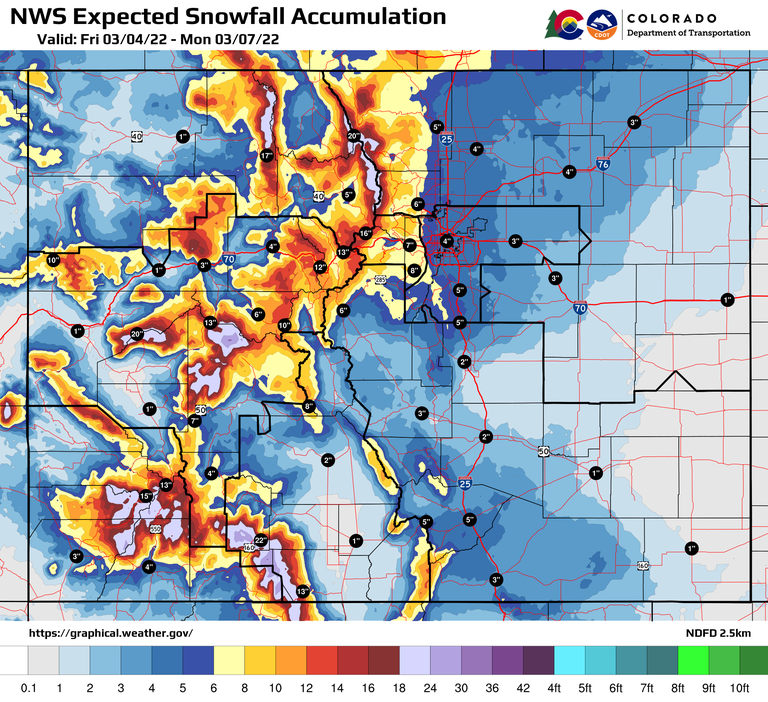Colorado— Another round of winter weather is expected this weekend. The National Weather Service forecasts heavy snowfall accumulations for the mountains of western and southwestern Colorado. Snow is expected to develop over the mountains this afternoon and continue through Sunday night or Monday morning. Treacherous road conditions are expected, especially on mountain passes.
The Denver area will also receive a mix of rain and snow over the weekend, which will create tricky driving conditions for metro motorists. The heaviest snow accumulations on the Front Range will be found in the foothills areas that typically see more snowfall. CDOT urges travelers to use caution, be patient and allow themselves extra time with increased ski traffic returning from the mountains to Denver on Sunday. Monday morning commuters should heed the same advice.
CDOT crews are ready and prepared for the weekend’s wave of winter weather. Today, CDOT crews started 24/7 snow shifts and will be plowing and treating roadways as needed. Once the storm has cleared, periodic road closures can be expected on mountain passes to allow for avalanche mitigation operations, possibly early next week.

Traveling During Snowstorms
- Avoid or limit driving during the brunt of the snowstorm.
- Check weather forecasts and road conditions frequently.
- If you must travel, make sure your vehicle is winter ready with the appropriate tires and snow emergency kit.
- Once you are out on the road, take it slow, no sudden stops and leave plenty of distance between vehicles.
- Give plows space! Stay back four car lengths from snow plows. Never pass plows on the right.
Know Before You Go
Travelers are urged to “know before you go.” Gather information about weather forecasts, anticipated travel impacts, and current road conditions prior to hitting the road. CDOT resources include:
- Travel webpage: COtrip.org
- Mobile app: COtrip Planner
- Check avalanche conditions at CAIC: avalanche.state.co.us
- Phone hotlines for road and weather conditions: 511 or 303-639-1111
- Sign up for project or travel alerts: bit.ly/COalerts
- Subscribe to construction updates and news releases: subscription.cotrip.org
- Follow social media: Twitter @coloradodot and Facebook facebook.com/coloradodot
Chain and Traction Laws
When weather and road conditions deteriorate, CDOT will activate Traction and Chain Laws for passenger and commercial vehicles. Motorists are alerted to active and current Traction or Chain Laws by highway signage, COtrip.org, and traffic/roadway condition alerts. For more information on the Traction Law and Passenger Vehicle Chain Law requirements, visit codot.gov/travel/winter-driving/tractionlaw. For more information on the Commercial Vehicle Chain Law requirements, visit codot.gov/travel/colorado-chain-law. To learn more and view helpful tips for winter driving, visit winter.codot.gov.
Watch Where You Park
Backcountry users and recreationists are urged to “watch where you park!” CDOT maintenance crews’ first priority is clearing the travel lanes of highways. Once this has been accomplished, crews will then clear the shoulders of the roadway and parking areas as time and resources permit. Please remember to park only in clearly marked and designated parking areas. Anyone leaving a vehicle unattended on the side of the road runs the risk of breaking the law, being fined, and having their vehicle towed away by law enforcement. (Download the flyer: “Watch Where You Park”)
Avalanche Forecast Information
Backcountry users are urged to check avalanche conditions at the CAIC website: www.avalanche.state.co.us.
"difficult" - Google News
March 05, 2022 at 05:56AM
https://ift.tt/25ELnup
Winter storm to cause difficult travel, especially over mountain passes - CODOT.gov
"difficult" - Google News
https://ift.tt/OyHV8uW
https://ift.tt/oPCwNGe
Bagikan Berita Ini














0 Response to "Winter storm to cause difficult travel, especially over mountain passes - CODOT.gov"
Post a Comment